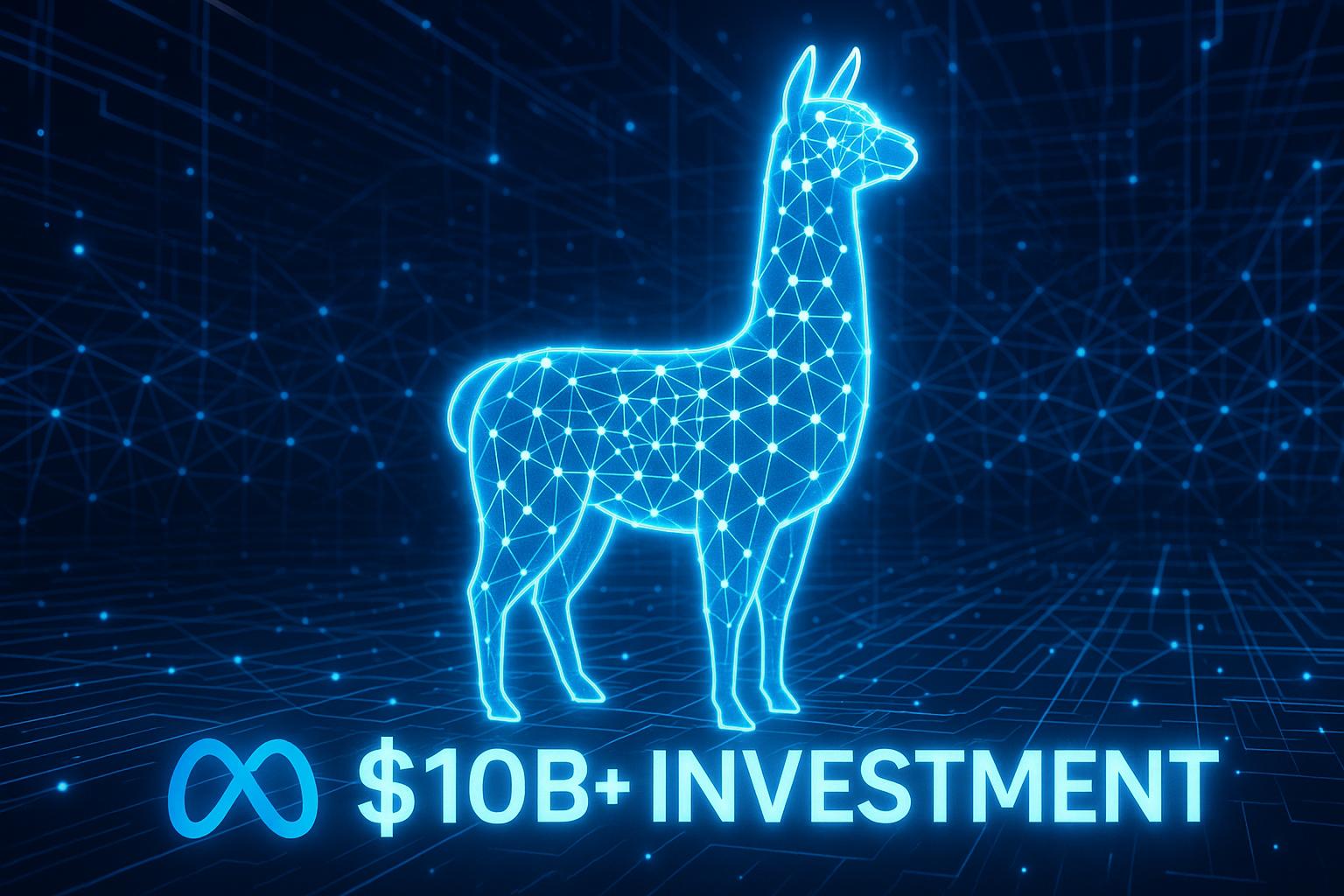Meta Platforms is poised for a historic multibillion-dollar investment in AI startup Scale AI, marking a notable departure from its traditional in-house development approach and intensifying its AI ambitions amid growing defence sector ties and industry-wide capital inflows.
Meta Platforms Inc. is reportedly in discussions for a multibillion-dollar investment in Scale AI, a prominent artificial intelligence startup that focuses on data labelling for machine-learning models. Sources indicate that the financing could surpass $10 billion, potentially making it one of the largest funding events for a private company in history. Although the details of the deal have yet to be finalised, this investment underscores Meta’s accelerated push into AI.
Scale AI, co-founded in 2016, has rapidly grown into an indispensable player in the AI market, securing significant contracts with high-profile clients, including Microsoft and OpenAI. Following a recent funding round, Scale was valued at approximately $14 billion, and earlier this year, reports suggested negotiations for a tender offer that could elevate its valuation to $25 billion. The startup generated revenue of $870 million in 2023 and anticipates this figure to more than double to $2 billion by 2025. Such growth reflects the broader trend in the industry, where AI startups cumulatively raised over $19 billion in venture capital in the first quarter of 2024, marking an increase from previous years.
Meta’s chief executive officer, Mark Zuckerberg, has declared AI as a top priority, promising a massive allocation of resources. In a previous statement, he noted an intention to invest as much as $65 billion into AI-related projects within the year. This focus aligns with Meta’s strategy to develop its Llama chatbot into a universal industry standard. Operating across platforms like Facebook, Instagram, and WhatsApp, Llama has already reached a milestone of one billion monthly users. In addition to bolstering its engagement with consumers, Meta aims to integrate advanced generative technologies across its platforms, thereby enhancing user experiences and maintaining competitiveness against other tech giants that have aggressively adopted similar innovations.
However, the planned investment is notable not only for its size but also because it represents a strategic shift for Meta. Historically, the company has relied mainly on in-house developments and collaborative projects rather than significant external investments. In contrast, competitors like Microsoft, which has invested over $13 billion in OpenAI, demonstrate a different approach. The uncertainties around how Meta’s investment strategy will unfold—given its lack of a cloud services arm—raise questions about the structure and implications of such a deal.
The defence sector also plays a pivotal role in this evolving narrative. Scale AI has been increasingly involved with U.S. military contracts, including one with the Defence Department focused on developing AI agent technology, which Scale labelled a “significant milestone.” Notably, Scale and Meta have been collaborating on a project named Defense Llama, which reconfigures Meta’s large language model specifically for military applications. This intersection of AI and defence technology highlights both companies’ growing interests in utilising AI for national security initiatives.
In tandem with these ambitious plans, Meta faces financial scrutiny. Following a shift in its revenue forecasts and increased spending on AI, the company’s stock has experienced volatility. Analysts have expressed concerns about the timing of these investments and their immediate impact on revenue, noting that while Meta’s focus on efficiency and cost-cutting is promising, the company still grapples with cautious projections from investors. Despite these challenges, Meta continues to position itself as a leader in the AI domain, with ongoing efforts to leverage innovative technologies in its advertising products and social media features.
This anticipated investment in Scale AI not only underscores Meta’s commitment to embracing and advancing AI capabilities but also reflects a larger trend within the tech industry, where substantial capital is increasingly flowing towards AI research and applications.
 Reference Map:
Reference Map:
- Paragraph 1 – [1], [2]
- Paragraph 2 – [2], [3]
- Paragraph 3 – [4], [5], [6]
- Paragraph 4 – [1], [6]
- Paragraph 5 – [3], [7]
- Paragraph 6 – [1], [6]
Source: Noah Wire Services
- https://theedgemalaysia.com/node/758258 – Please view link – unable to able to access data
- https://www.reuters.com/technology/ai-startup-scale-ai-raises-1-billion-fresh-funding-2024-05-21/ – In May 2024, Scale AI secured $1 billion in a late-stage funding round led by Accel, with significant investments from Nvidia, Amazon, and Meta, valuing the AI data startup at nearly $14 billion. Founded in 2016, Scale AI specializes in providing precise data labeling crucial for training advanced AI models, supporting clients like Microsoft, Morgan Stanley, OpenAI, and Cohere. This funding round is part of a growing trend in AI investments, with AI startups raising $19.15 billion in venture capital in Q1 2024, an increase from $16.36 billion the previous year. Scale AI plans to use the new funds to enhance data capabilities for enterprise customers and the U.S. Department of Defense, and to participate in the DEFCON 31 red-teaming event as part of White House initiatives on safe AI innovation.
- https://www.ft.com/content/698c79e0-0b0b-401d-8132-99a42f236b92 – Meta Platforms Inc. has been investing heavily in artificial intelligence (AI), with CEO Mark Zuckerberg making AI the company’s top priority. In January 2024, Zuckerberg announced plans to spend up to $65 billion on AI-related projects that year. This includes efforts to make Llama, Meta’s AI chatbot, the industry standard worldwide. Llama is already available on Facebook, Instagram, and WhatsApp, with one billion users per month. Despite these investments, Meta’s stock has faced challenges due to increased AI spending and cautious revenue forecasts.
- https://www.reuters.com/technology/meta-raises-2024-expenses-forecast-support-ai-development-2024-04-24/ – Meta Platforms saw a sharp decline in its stock market value after it announced a higher expenses forecast and lower-than-expected revenue projections. Shares fell about 15% in extended trade, reducing its market capitalization to roughly $1 trillion. The company anticipates April-June revenue to be between $36.5 billion and $39 billion, below analyst estimates. Meta raised its 2024 expense forecast to $96 billion-$99 billion to support AI investments and computing infrastructure. CEO Mark Zuckerberg acknowledged the increased focus on AI investments, which may not immediately generate revenue. Meta’s Reality Labs division reported lower-than-expected sales and significant losses. Despite these financial strains, Meta continues to integrate AI into its advertising products and social media features, with plans for more prominent AI applications. However, investors remain cautious about the long-term payoff of these AI expenditures.
- https://www.axios.com/2023/06/08/meta-ai-zuckerberg-announcement-generative – Meta CEO Mark Zuckerberg announced the company’s plan to integrate generative AI technologies, including text, image, and video generators, into its major platforms like Facebook and Instagram. During an all-hands meeting, Zuckerberg described this initiative as an extension of Meta’s metaverse ambitions rather than a shift away from them. The technologies range from those in developmental stages to consumer-ready applications. This move aims to catch up with competitors who have been quicker to adopt AI tools in their products. Zuckerberg highlighted the significant advances in generative AI over the past year, noting the opportunity to incorporate these breakthroughs across Meta’s offerings. Additionally, Zuckerberg expressed confidence in Meta’s competitive edge over Apple’s upcoming Vision Pro headset, emphasizing the affordability of Meta’s devices, including the Quest 3 headset set to launch at $499.
- https://www.apnews.com/article/abc3e389d97fb97c661ccb6acfcf65c7 – Meta Platforms Inc. reported a substantial increase in profit and revenue for Q4 2023, primarily due to a rebound in digital advertising and significant cost-cutting measures. The company earned $14 billion in profit, up from $4.65 billion the previous year, with revenue growing to $40.11 billion. Meta’s CEO Mark Zuckerberg labeled 2023 as the ‘year of efficiency,’ reflecting the company’s strategic layoffs and operational improvements. Active user numbers also rose, reaching 3.98 billion across its apps. Despite high expectations for the first quarter of 2024, Meta faces challenges, including integrating AI with its metaverse investments and potential ad revenue declines from Chinese markets. Shares of Meta saw a notable rise following the earnings announcement.
- https://www.apnews.com/article/378d5a7e487b7b17bf89c2ad0cad4a6c – Meta, the parent company of Facebook and Instagram, announced a significant increase in first-quarter profit, more than doubling from the previous year due to increased advertising revenue and a rise in average ad prices. The company earned $12.37 billion, or $4.71 per share, and reported a revenue of $36.46 billion, surpassing analysts’ expectations. However, Meta’s shares fell by 16% in after-hours trading due to cautious revenue guidance for the second quarter, forecasting between $36.5 billion and $39 billion, lower than analysts’ predictions. Meta’s capital expenses are expected to rise due to investments in artificial intelligence, projecting costs between $35 billion and $40 billion for 2024. The company continues to see growth in user numbers across its platforms, with 3.24 billion users in March. Despite workforce reductions and increased efficiency measures, investor concerns remain about near-future revenue performance.
Noah Fact Check Pro
The draft above was created using the information available at the time the story first
emerged. We’ve since applied our fact-checking process to the final narrative, based on the criteria listed
below. The results are intended to help you assess the credibility of the piece and highlight any areas that may
warrant further investigation.
Freshness check
Score:
9
Notes:
The narrative is recent, published on June 8, 2025. Similar reports have appeared in reputable outlets like Reuters and El País on the same date, indicating a coordinated release of information. The report cites anonymous sources familiar with the matter, which is common in financial reporting but limits verifiability. The mention of a potential investment exceeding US$10 billion aligns with previous valuations of Scale AI, which were around US$14 billion in 2024. The report also notes that the terms of the deal are not finalised and could still change, indicating that the information is preliminary. ([reuters.com](https://www.reuters.com/business/meta-talks-scale-ai-investment-that-could-top-10-billion-bloomberg-news-reports-2025-06-08/?utm_source=openai), [cincodias.elpais.com](https://cincodias.elpais.com/companias/2025-06-08/meta-negocia-una-inversion-en-la-empresa-de-inteligencia-artificial-scale-por-mas-de-8700-millones.html?utm_source=openai))
Quotes check
Score:
8
Notes:
The report includes direct quotes from anonymous sources familiar with the matter, which is standard in financial reporting but limits verifiability. The report also notes that the terms of the deal are not finalised and could still change, indicating that the information is preliminary. ([reuters.com](https://www.reuters.com/business/meta-talks-scale-ai-investment-that-could-top-10-billion-bloomberg-news-reports-2025-06-08/?utm_source=openai))
Source reliability
Score:
7
Notes:
The narrative originates from The Edge Malaysia, a reputable news outlet in Malaysia. The report cites anonymous sources familiar with the matter, which is common in financial reporting but limits verifiability. The report also notes that the terms of the deal are not finalised and could still change, indicating that the information is preliminary. ([reuters.com](https://www.reuters.com/business/meta-talks-scale-ai-investment-that-could-top-10-billion-bloomberg-news-reports-2025-06-08/?utm_source=openai))
Plausability check
Score:
9
Notes:
The report’s claims are plausible and align with known information about Meta’s AI investments and Scale AI’s recent funding rounds. The mention of a potential investment exceeding US$10 billion aligns with previous valuations of Scale AI, which were around US$14 billion in 2024. The report also notes that the terms of the deal are not finalised and could still change, indicating that the information is preliminary. ([reuters.com](https://www.reuters.com/business/meta-talks-scale-ai-investment-that-could-top-10-billion-bloomberg-news-reports-2025-06-08/?utm_source=openai))
Overall assessment
Verdict (FAIL, OPEN, PASS): OPEN
Confidence (LOW, MEDIUM, HIGH): MEDIUM
Summary:
The narrative presents plausible information about Meta’s potential investment in Scale AI, aligning with known facts and recent developments. However, the reliance on anonymous sources and the preliminary nature of the information warrant caution. The report’s freshness is high, but the lack of finalised details and the use of anonymous sources reduce the overall confidence in the information’s accuracy.













